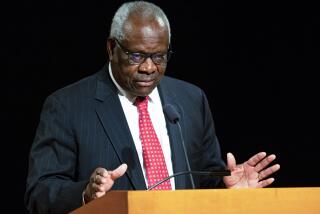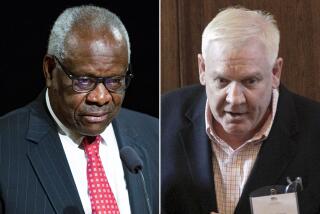Ex-governor testifies in Hollinger trial
- Share via
CHICAGO — Former Illinois Gov. James Thompson testified Tuesday that key directors of Conrad Black’s Hollinger International Inc. were kept in the dark while $15.2 million that should have gone to the shareholders was instead sent to a Black-controlled company in Canada.
“Hollinger International should have received the noncompete payment but it went to somebody else,” Thompson testified at the former media mogul’s fraud trial. Thompson was a member of Hollinger International’s board.
Black, 62, is charged with swindling $84 million from the Hollinger International Inc. newspaper conglomerate he once controlled by selling off hundreds of community papers and pocketing payments from the purchasers.
The payments were made in exchange for promises not to return to the areas where the papers circulated and go into competition with the new owners.
Noncompete payments are common in the publishing industry. But federal prosecutors said the money should have gone to Hollinger International shareholders and not into Black’s pocket and those of other former Hollinger International executives on trial with him.
Black and three co-defendants, John Boultbee, Peter Y. Atkinson and Mark Kipnis, said that nothing they did was illegal.
Thompson seemed relaxed as he took the witness stand in the very courthouse where he was once the chief prosecutor. His record as a corruption-busting U.S. attorney in Chicago was the springboard for his four terms as governor of Illinois.
Assistant U.S. Atty. Eric H. Sussman asked Thompson whether he had been familiar with the newspaper industry before joining Hollinger’s board.
“Just as the subject of it,” Thompson quipped. He said he gradually learned about the business side of the industry during his time on the board of directors.
Thompson eventually became the chairman of the board’s audit committee, which was supposed to scrutinize related-party transactions -- deals in which Hollinger was doing business with a firm in which someone in Hollinger’s management had a financial stake.
Sussman began by focusing on Hollinger’s decision to sell its American Trucker magazine to Primedia Inc. in November 1998. The deal resulted in $2 million of the sale price being sent to Hollinger Inc., a company with a name like Hollinger International but that was separate from it.
The Toronto, Canada, company was largely owned by Black and was used by him through a complex stock arrangement to gain a controlling interest in Chicago-based Hollinger International.
Sussman asked Thompson whether anyone in Hollinger International management had told him that $2 million in noncompete money from the American Trucker deal was being funneled to the Canadian company.
“No,” Thompson said.
“When did you learn that a transaction sending $2 million to Hollinger Inc. had occurred?” Sussman asked.
“Much later,” Thompson said. Pressed by Sussman to be more specific, Thompson said it was only after the board of directors had rebelled against Black’s management and launched an outside investigation of the firm.
Thompson was asked whether top management should have made the audit committee aware that the money was going to Hollinger Inc.
“Yes, because it was a related party transaction,” he said.
Thompson also said the audit committee should have been told that Hollinger Inc. was to receive $12 million in noncompete payments from the $472-million sale of 45 Hollinger International-owned papers to Community Newspaper Holdings Inc. of Birmingham, Ala., that occurred around the same time as the sale of American Trucker.
But Thompson said he was never told about that or the $1.2 million in noncompete money sent to Hollinger Inc. as a result of the sale of Hollinger International-owned newspapers to Horizon Publications Inc., a company in which Black held an ownership stake.
More to Read
Inside the business of entertainment
The Wide Shot brings you news, analysis and insights on everything from streaming wars to production — and what it all means for the future.
You may occasionally receive promotional content from the Los Angeles Times.









